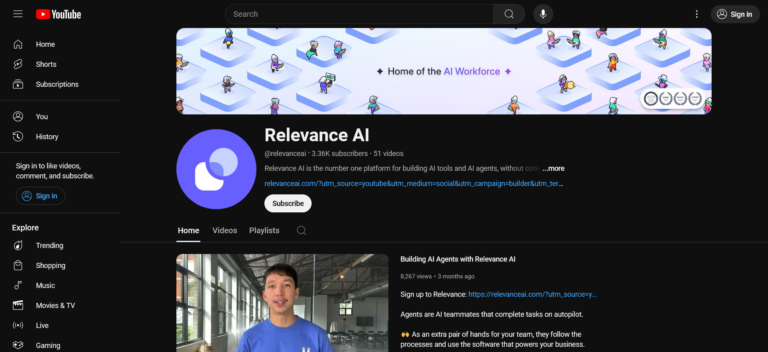The Difference Between AI Tools and Agents: Insights from Relevance AI
Relevance.ai
Absolutely incredible! Relevance.ai’s Agents are a true game-changer for any team looking to automate workflows and enhance productivity. These AI teammates handle tasks on autopilot, becoming an extra pair of…
Key Take-aways
- AI Tools for Predictable Automation: AI tools excel in automating repeatable and deterministic tasks. They require consistent inputs and follow defined steps, making them suitable for structured processes.
- AI Agents for Dynamic Problem Solving: AI agents are designed to handle unpredictable tasks, making decisions based on varying inputs and changing conditions. They act as flexible interfaces for complex problem-solving.
- Choosing Between AI Tools and Agents: AI tools are ideal for predictable tasks like search queries or content generation. AI agents are better for tasks that involve decision-making, adaptability, and integrating multiple tools in real-time.
In a recent discussion, Relevance AI’s head of sales, Ro, shared a compelling demonstration of how AI tools and agents operate differently. This article explores the key differences between AI tools and agents, offering practical guidance on when to use each for maximum effectiveness.
Success Stories: Building Effective AI Tools and Agents
Ro’s demonstration showcased the versatility of AI tools and agents:
- Building an AI Tool for Predictable Tasks: Ro developed a Google search tool that consistently handles queries and returns results. The AI tool functions with deterministic reliability, processing the same steps every time, regardless of the input variation.
- Example: The tool performs a Google search when prompted and can easily be expanded to include additional search engines like Bing. This expansion allows users to decide which engine to use based on the same predictable conditions.
- Leveraging AI Agents for Dynamic Tasks: Ro built an AI agent capable of handling complex queries without predefined instructions. In his example, the agent not only performed Google searches but also analyzed the sentiment of the results autonomously, deciding on the best approach based on the given task.
- Example: The agent independently determined the number of searches needed, the types of queries to use, and how to analyze the data based on changing inputs, showcasing the adaptability of AI agents.
What are AI Tools and Agents? Key Features of Each Approach
AI tools and agents offer distinct capabilities in the automation landscape. Here’s a breakdown of their core characteristics:
- AI Tools: Best for predictable and structured tasks that require consistent inputs. AI tools are designed to perform specific functions repeatedly, making them ideal for workflows with clear conditions and deterministic outcomes.
- Examples: Google search automation, content generation workflows, and step-by-step task execution.
- AI Agents: Suited for dynamic tasks that require decision-making and adaptability. AI agents can assess varying inputs and determine the best course of action, making them useful for unstructured tasks.
- Examples: Complex research, natural language interfaces for related tools, and multi-tool coordination.
- Agentic Reasoning: AI agents leverage agentic reasoning to decide which tools to use, how to use them, and how to process tasks based on the context of the situation. This approach differs from AI tools, which rely on predetermined steps and inputs.
Building AI Tools and Agents: Best Practices from Relevance AI
Ro shared key insights into building effective AI tools and agents at Relevance AI:
- Use Cases for AI Tools:
- Repeatable Tasks: AI tools are ideal for automating repetitive tasks with consistent inputs. For example, Ro’s Google search tool handles specific search queries, providing consistent results every time.
- Content Generation: When creating content, AI tools can use various language models to generate different parts of a blog post. By breaking the content into sections (e.g., introduction, body, conclusion), AI tools offer more control and precision.
- Example from Relevance AI: Relevance AI’s content generation tools allow users to specify different models for different sections of an article, optimizing the output for tone, clarity, and engagement.
- Use Cases for AI Agents:
- Dynamic Problem Solving: AI agents are well-suited for tasks that require decision-making, adaptability, and real-time adjustments. For example, Ro’s agent autonomously decided how many searches to perform and which results to analyze based on the task requirements.
- Tool Integration: AI agents can act as interfaces for multiple tools, coordinating their functions based on user inputs and task complexity.
- Example from Relevance AI: Relevance AI’s multi-tool agents manage various marketing tasks, such as keyword research, content performance analysis, and blog post generation, using a flexible agentic interface.
Top Use Cases for AI Tools and Agents
When deciding whether to use an AI tool or an AI agent, consider the task’s complexity and predictability. Here are some top use cases:
- AI Tools:
- Consistent Workflow Automation: Automate processes like lead generation, keyword research, or structured content creation.
- Predictable Inputs and Outputs: Ideal for tasks that require consistent inputs, like repetitive queries or predefined steps.
- AI Agents:
- Dynamic Task Management: Manage complex tasks that vary based on inputs, such as customer inquiries, data analysis, or sales support.
- Multi-Tool Coordination: AI agents excel in coordinating multiple tools, making them useful for integrated workflows that require adaptive decision-making.
Starting with simpler, deterministic tasks can help you understand the capabilities of AI tools, while exploring more complex tasks will allow you to leverage the power of AI agents effectively.
Analyzing the Differences Between AI Tools and Agents
While both AI tools and agents offer valuable automation capabilities, they differ in several key areas:
- Task Complexity: AI tools handle tasks with clear, predictable steps, while AI agents manage dynamic, unpredictable tasks that require real-time decision-making.
- Integration and Coordination: AI agents serve as natural language interfaces, integrating multiple tools and adapting to varying task requirements.
- Control vs. Adaptability: AI tools offer control and precision for deterministic tasks, while AI agents provide flexibility for complex, evolving problems.
By understanding these differences, developers can make informed decisions about which approach best suits their needs.
Monetization Methods for AI Tools and Agents
For businesses and developers looking to monetize AI tools and agents, consider these strategies:
- Software as a Service (SaaS): Offer AI tools and agents as subscription-based services, providing ongoing support, updates, and new features.
- Custom Solutions: Create bespoke AI tools or agents tailored to specific industries, offering consulting services to help businesses automate processes.
- Educational Courses: Develop courses that teach others how to build and use AI tools and agents effectively, leveraging platforms like Relevance AI.
Is AI Automation Right for You?
AI tools and agents represent a fundamental shift in how automation is designed and deployed. While AI tools excel in predictable, structured tasks, AI agents bring a new level of adaptability and decision-making to complex problems.
If you’re looking to automate repeatable tasks with consistent outcomes, AI tools are the way to go. For more complex challenges that require decision-making and real-time adjustments, AI agents offer a dynamic solution.
Relevance AI continues to refine its AI tools and agents, enabling users to leverage both deterministic and agentic automation in innovative ways. Whether you’re new to AI automation or looking to enhance your existing workflows, understanding the difference between AI tools and agents is crucial for effective implementation.
Explore the potential of AI tools and agents today, and discover how automation can transform your business processes.

